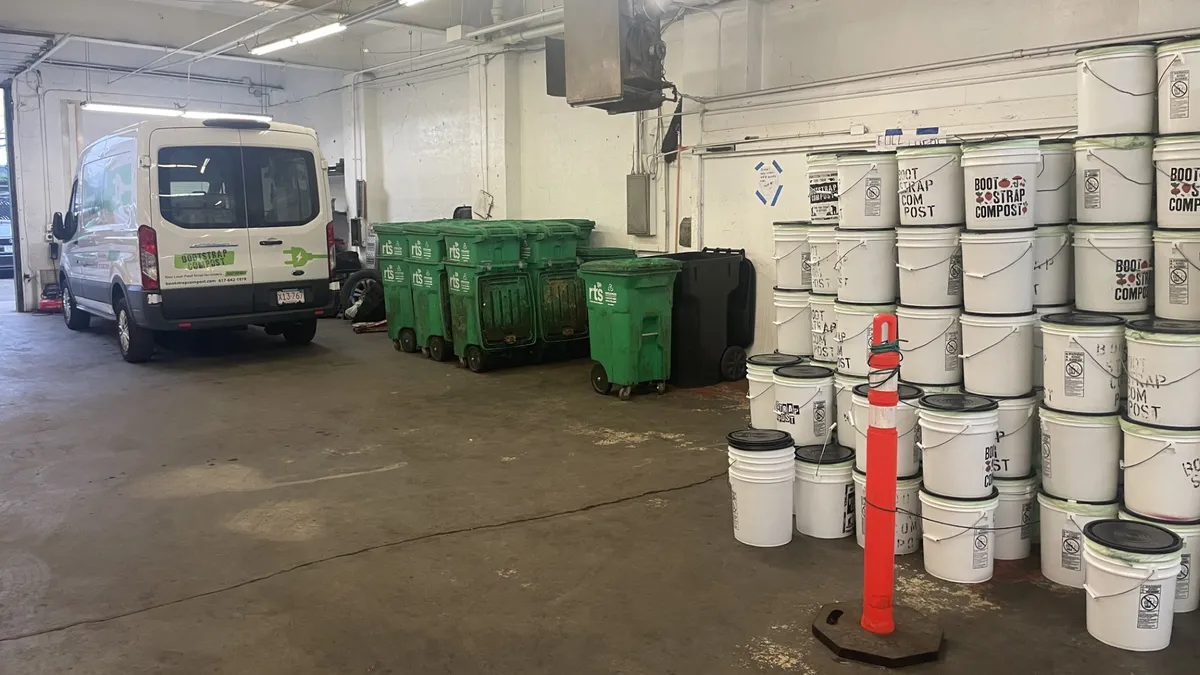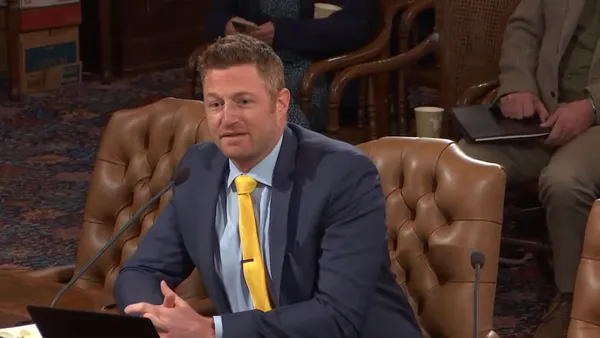Dive Brief:
- Massachusetts-based Bootstrap Compost, an organics hauler, is pursuing a unique fundraising model to scale its business. The company recently launched its Bootstrap Bond program, with the goal of eventually raising $750,000.
- Customers can invest small amounts, over a six-year period, at a 6% interest rate. Bootstrap has raised $79,500 so far, which helped fund a part-time marketing position to grow commercial business, a new truck transmission and 100 branded collection containers.
- The company currently operates in multiple Northeast states and is ramping up to service locations such as new schools in Rhode Island (its fastest growing customer base), the CVS headquarters and a Boston Housing Authority complex (supported by a $20,000 grant from the Institute for Local Self-Reliance).
Dive Insight:
The organics recycling sector has seen considerable growth in New England, with companies at a variety of scales serving different customer bases. Bootstrap, founded in 2011, started with a focus on household bucket service but has adapted in recent years as residential programs become more widespread.
Today, the company employs 30 people — 15 drivers, 10 administrators (including its three co-owners) and five warehouse members. It operates out of three service locations to service parts of eastern Massachusetts, southern New Hampshire, Rhode Island and New York’s Hudson Valley. This spans an estimated 4,000 residential accounts, 300 commercial accounts and 80 schools.
Bootstrap partners with regional composters to process the material. It also recently started sending an estimated 2% of overall material to an anaerobic digester in Rhode Island and provides some to farmers for animal feed.
CEO Andy Brooks said the company has been “largely bootstrapped since we started,” with support from a long-term Small Business Administration loan, promissory notes and grants. The bond program, inspired in part by the company Walden Local Meat, was launched to further involve an already engaged customer base.
“It's not a huge moneymaker by any means, but it's not meant to be either. It's meant to give people a vehicle for supporting our work and our growth over a fairly long period of time,” said Brooks. "It's really been a conversation starter.”
The program, which launched in April and is set to wrap its first phase on Sept. 15, has also led to outside interest from other potential partners. According to bond documents, proceeds are intended for a range of working capital needs, debt and other expenditures. The original document also mentioned plans to lease a second small-scale digester from Harp Renewables, but Brooks said the company is not pursuing that and decided to sell its original unit.
The bond program also cited plans for some proceeds to help service environmental justice communities at a discounted rate, including Everett, Massachusetts, where Bootstrap has one of its hauling locations. Bootstrap also aims to continue working with the Boston Housing Authority to grow service after a one-year program at a complex in the Charlestown neighborhood wraps up.
While residential bucket service is still growing in states such as Florida, where organics recycling programs are less developed, Brooks said the market has evolved in some of Bootstraps’s service areas.
Some of Massachusetts' larger cities and towns have launched organics recycling programs in recent years, either through a direct contract — such as Boston’s agreement with Garbage to Garden and Save That Stuff — or a preferred vendor approach in which the local government endorses a particular company. Black Earth Compost has been particularly focused on partnering with local governments via the latter strategy.
Brooks said he’s not a fan of the preferred vendor approach, because in his view it creates a “false narrative” that the endorsed company is the best option when others could still be a good fit for the type of service a given customer wants.
“As much as we like residential, and it's been our bread and butter for so long, the writing's on the wall,” said Brooks. “We're perhaps not the best suited for large-scale residential programs. We're a premium service. We're not inexpensive, and we're not for every community. We're for people who are looking for a clean bucket with zero fuss.”
The Massachusetts Department of Environmental Protection has indicated that a statewide ban on residential organics disposal could be an option in the future, as part of its broader 2030 goals that include cutting food waste disposal in half. In the meantime, the agency is enforcing a disposal ban for certain large commercial or institutional generators and this is seen as a growth area.
While other states in Bootstrap’s service area have adopted related policies — including New York, Rhode Island and soon New Hampshire — their enforcement and efficacy varies. A recent study published in Science, and first reported by Bloomberg, found that Massachusetts’ policy has been most effective to date.
Local organics haulers say that even with these policies in place there is still a need for marketing to gain new customers and for quality customer service to keep them. The waste industry’s largest haulers are still not heavily competing in this area, with the exception of states such as Vermont or California that have universal organics recycling policies, so this leaves room for others to grow. And as the market evolves, Brooks expects there will be a role for companies of all sizes.
"In order to really make composting ubiquitous, you're going to have to lean on a collective effort from many different stakeholders, from small hyperlocal community compost companies using bikes to more conventional dump trucks to something in between,” said Brooks. "I think that we have found a niche and a specialty in our approach and in our execution that I'm confident that Bootstrap will be around for decades to come."















